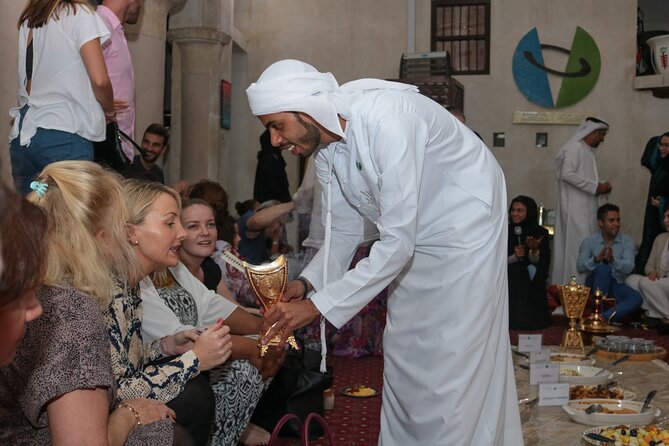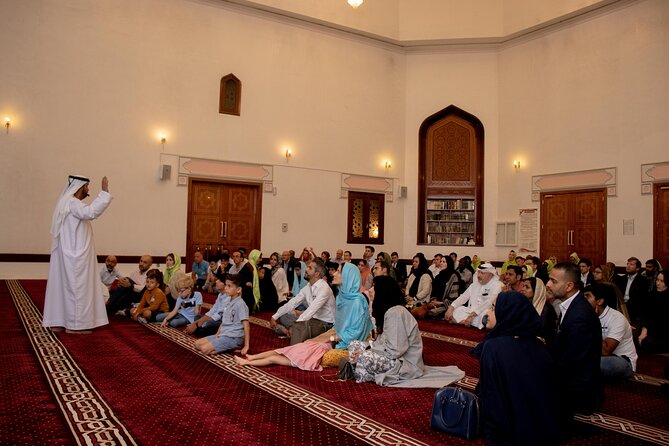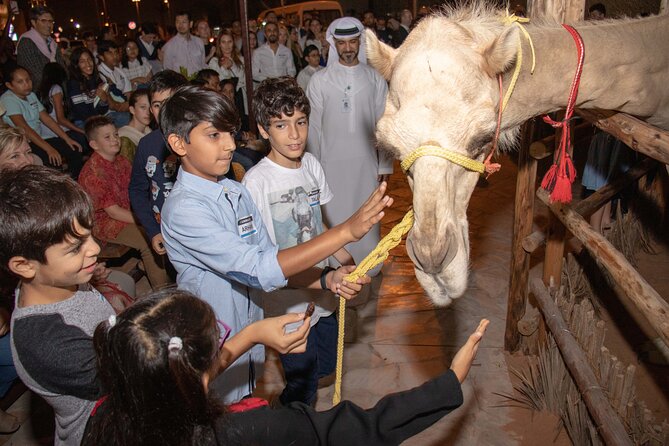Cultural Iftar ( Ramadan)
With the sun dipping below the horizon, an air of anticipation fills the hearts of those partaking in Cultural Iftar. The breaking of the fast during Ramadan is not merely a physical nourishment but a spiritual feast that binds communities together.
As the aroma of delectable dishes wafts through the air, a sense of unity and shared joy permeates the gatherings. But what lies beyond the culinary delights and shared meals?
Stay tuned to uncover the layers of significance and traditions that make Cultural Iftar a cherished cornerstone of Ramadan festivities.
Key Points

- Cultural Iftar fosters community bonds and understanding of Ramadan traditions.
- Traditional practices like Tarawih prayers and Quran reading strengthen faith and unity.
- Iftar foods symbolize unity, generosity, and cultural significance.
- Etiquette during Iftar emphasizes hospitality, togetherness, and communal prayers.
Significance of Cultural Iftar

The Cultural Iftar experience offers a unique insight into the rich traditions and customs observed during Ramadan. One of the key aspects of Ramadan traditions is the practice of breaking the fast at sunset, known as Iftar. This communal meal not only holds religious significance but also serves as a time for social gatherings.
Families and friends come together to share this special meal, fostering a sense of community and togetherness. The act of breaking the fast with loved ones strengthens bonds and creates lasting memories. These social gatherings during Iftar encourage unity, empathy, and generosity, values that are central to the spirit of Ramadan.
Through these shared experiences, participants deepen their understanding of the cultural significance of Ramadan traditions.
Traditional Ramadan Practices

Exploring the customs deeply rooted in Ramadan, traditional practices encompass various rituals and observances that embody the essence of this sacred month.
- Tarawih Prayers: Congregational prayers performed at night after the obligatory Isha prayer during Ramadan.
- Reading the Quran: Muslims engage in reciting and reflecting upon the Quran more frequently during Ramadan.
- Charitable Giving: A significant Ramadan tradition involves giving to those in need through acts of charity and community service.
These Ramadan traditions not only serve as a way to strengthen one’s faith but also foster a sense of unity and empathy within the community.
Cultural celebrations during Ramadan often revolve around these practices, creating a deeply meaningful and spiritually enriching experience for participants.
Cultural Iftar Foods and Dishes
Delving into the rich tapestry of flavors and culinary traditions that grace the tables of Cultural Iftar gatherings offers a tantalizing glimpse into the diverse and vibrant world of Ramadan cuisine. During Iftar, families and communities come together to break their fast with a variety of dishes that hold special significance during this holy month.
Traditional Ramadan recipes like dates, lentil soup, samosas, and baklava are commonly prepared. These dishes not only satisfy hunger but also hold cultural importance, symbolizing unity and generosity. Across different regions, Iftar traditions showcase a blend of local ingredients and cooking techniques, creating a unique culinary experience.
From savory to sweet, these dishes reflect the spirit of Ramadan and the joy of sharing meals with loved ones.
Etiquette and Customs During Iftar
During Iftar, participants are encouraged to begin by breaking their fast with a few dates and a sip of water. This practice dates back to Prophet Muhammad’s traditions and symbolizes the end of the fast.
As the meal progresses, individuals engage in the following customs:
-
Sharing: It’s customary to share food with family, friends, and neighbors, fostering a sense of community and togetherness.
-
Prayer: Many gather for a communal prayer before or after the meal, offering thanks and seeking blessings.
-
Hospitality: Hosting Iftar dinners is a common practice, where hosts open their homes to guests, showcasing generosity and warmth.
These Iftar traditions not only nourish the body but also enrich social gatherings with spiritual significance.
Celebrating Unity Through Iftar
As Iftar gatherings bring people together in shared meals and traditions, the celebration of unity becomes a central theme during this auspicious time of Ramadan.
These gatherings serve as a powerful platform for fostering unity and diversity within communities. Participants from various backgrounds come together to break their fast, emphasizing the importance of togetherness.
The act of sharing food during Iftar symbolizes community bonding, with individuals setting aside differences to partake in a collective experience. In these moments, people not only nourish their bodies but also their spirits, forming connections that transcend cultural divides.
Through the rituals of Iftar, unity is celebrated, highlighting the strength found in diversity and the beauty of coming together as one community.
Common questions
How Can I Find Cultural Iftar Events Near Me to Participate In?
To find cultural iftar events nearby, you can explore local community centers, cultural organizations, or event listings online. Understanding Ramadan and following iftar etiquette can enhance the experience, fostering cultural exchange and connection within the community.
Are There Any Specific Cultural Traditions or Customs Associated With Cultural Iftar That Vary From Region to Region?
Regional variations in customs and traditions can bring unique elements to cultural iftar practices. Differences in meal timings, preferred dishes, and social etiquette showcase the rich diversity of how communities across different regions celebrate this important ritual.
What Are Some Unique Cultural Iftar Dishes or Foods That Are Not Commonly Known?
When it comes to unique culinary exploration, fusion cuisine brings together global recipes with exotic flavors. These dishes offer a delightful mix of diverse tastes and textures, providing a new experience for adventurous foodies.
How Can I Respectfully Participate in Cultural Iftar if I Am Not Part of the Same Cultural or Religious Background?
To participate respectfully in a different cultural or religious event, one must embrace cross-cultural etiquette and strive for inclusive participation. Understanding traditions, showing genuine interest, and being open-minded are key to fostering meaningful connections.
Are There Any Recommended Ways to Show Appreciation for the Host During a Cultural Iftar Gathering?
To show appreciation for a host, one can offer thoughtful gestures like a small gift or a heartfelt thank you. Following cultural etiquette, these acts convey gratitude and respect in a meaningful way.
Last Words
To sum it up, Cultural Iftar during Ramadan is a time of unity, gratitude, and reflection for Muslims around the world. By coming together to break their fast, share traditional dishes, and observe customs and etiquette, individuals strengthen their bonds with loved ones and their faith.
It’s a time to celebrate the rich tapestry of cultural practices that define this sacred month, reminding us of the importance of togetherness and community in our lives.